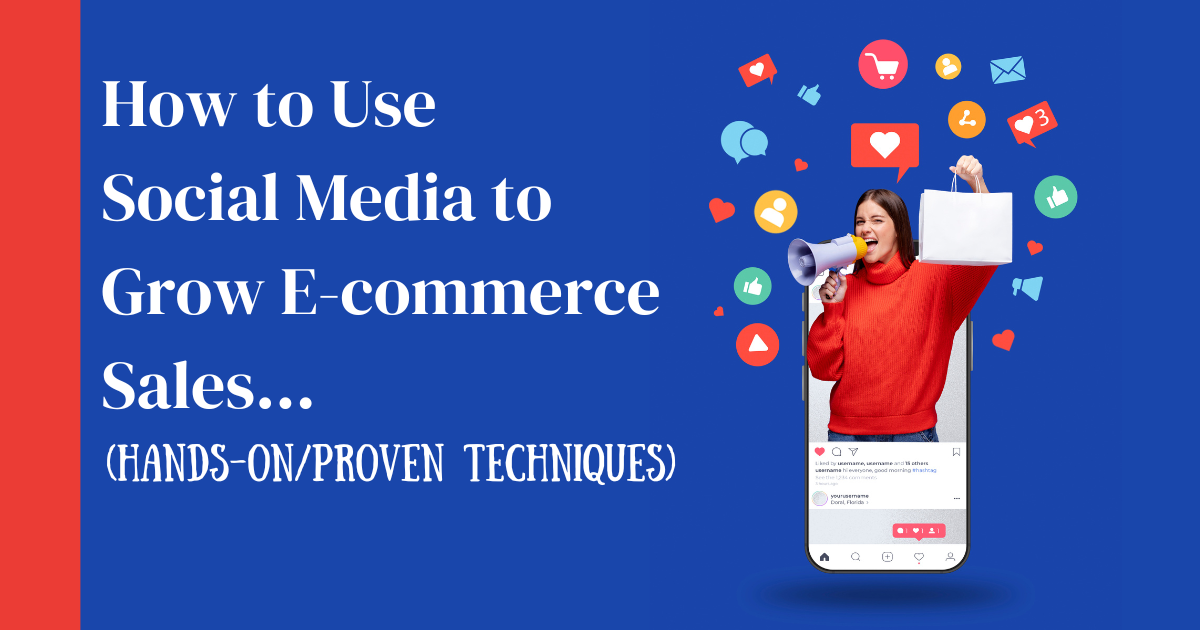Introduction to Social Media for Ecommerce
In today’s digital age, social media has become an indispensable tool for businesses looking to expand their online presence and boost sales. Ecommerce brands, in particular, social media marketing can leverage the power of platforms like Facebook, Instagram, Twitter, and Pinterest to reach a wider audience, engage with customers, and drive conversions.
What is social media marketing?
Social media marketing involves creating and sharing content on social media platforms to achieve marketing and branding goals. It encompasses various activities such as posting text and image updates, videos, and other content that drives audience engagement.
Importance of social media for ecommerce growth
For ecommerce businesses, social media provides an unparalleled opportunity to showcase products, interact with customers, and drive traffic to their online stores. By building a strong presence on social media, brands can increase brand awareness, foster customer loyalty, and ultimately drive sales.
Understanding Your Audience
Before diving into social media marketing, it’s essential to understand your target audience. By identifying your potential customers’ demographics, interests, and online behavior, you can effectively tailor your social media strategy to resonate with them.
Identifying target demographics
Utilize analytics tools provided by social media platforms to gain insights into your followers’ demographics. Understanding factors such as age, gender, location, and interests can help you create content that appeals to your target audience.
Analyzing consumer behavior on social media
Monitor how your audience interacts with your content on social media. Pay attention to which types of posts receive the most engagement, as well as the times of day when your audience is most active. Use this data to refine your content strategy and optimize your posting schedule.
Optimizing Profiles Across Platforms
Consistency is key when it comes to branding your ecommerce business on social media. Ensure that your profiles on all major platforms are visually appealing, informative, and consistent with your brand identity.
Creating compelling profiles on major social media platforms
Customize your profile banners, profile pictures, and bio sections to reflect your brand image. Use high-quality images and concise, compelling copy to capture the attention of visitors to your profile.
Ensuring consistency in branding and messaging
Maintain a cohesive brand identity across all social media platforms. Use consistent colors, fonts, and language to reinforce your brand’s message and values. This consistency helps to build trust and recognition among your audience.
Creating Engaging Content
E-commerce brands must create content that resonates with their target audience and encourages interaction to stand out on social media.
Types of content that resonate with ecommerce audiences
Experiment with different types of content, including product photos, videos, user-generated content, and behind-the-scenes glimpses of your business. Tailor your content to your audience’s preferences and showcase your products in creative and engaging ways.
Utilizing multimedia formats effectively
Take advantage of the diverse range of multimedia formats available on social media platforms. Experiment with video tutorials, live streams, carousel ads, and interactive polls to keep your audience engaged and entertained.
Implementing Paid Advertising
While organic social media reach is valuable, paid advertising can significantly amplify an e-commerce brand’s visibility and reach.
Leveraging paid social media campaigns
Invest in targeted advertising campaigns on platforms like Facebook Ads and Instagram Ads. Set specific objectives for your campaigns, whether it’s driving traffic to your website, generating leads, or increasing sales.
Setting budgets and targeting options for maximum ROI
Allocate your advertising budget strategically and experiment with different targeting options to reach your ideal customers. Refine your targeting based on demographics, interests, behaviors, and past interactions with your brand to maximize the return on your investment.
Read More Related Blog: Social Media: Definition, Importance, Top Websites & Apps
Leveraging Influencer Marketing
Influencer marketing can be a powerful tool for ecommerce brands looking to reach new audiences and build credibility.
Identifying relevant influencers in your niche
Research influencers who align with your brand values and target audience. Look for influencers with a genuine and engaged following, as well as a track record of collaborating with brands in your industry.
Collaborating with influencers to promote products
Reach out to influencers and propose collaboration opportunities, such as sponsored posts, product reviews, or affiliate partnerships. Give influencers free product samples and encourage them to share their authentic experiences with their followers.
Encouraging User-Generated Content
User-generated content (UGC) is a valuable asset for ecommerce brands, as it provides social proof and authentic endorsements from satisfied customers.
Strategies to inspire customers to create and share content
Encourage your customers to share photos and reviews of your products on social media by offering incentives such as discounts, giveaways, or featured spots on your profile. Highlight user-generated content on your own social media channels to showcase real-life experiences with your products.
Harnessing the power of user-generated reviews and testimonials
Display user-generated reviews and testimonials prominently on your website and social media profiles. Positive reviews and testimonials can reassure potential customers and persuade them to make a purchase.
Measuring and Analyzing Results
Track key metrics and analyze performance data regularly to gauge the effectiveness of your social media marketing efforts.
Key metrics to track for social media success
Monitor metrics such as engagement rate, reach, impressions, click-through rate, conversion rate, and return on ad spend (ROAS). Use analytics tools provided by social media platforms or third-party software to track these metrics accurately.
Tools for monitoring performance and making data-driven decisions
Utilize analytics tools such as Facebook Insights, Instagram Insights, Google Analytics, and social media management platforms to track your social media performance. Use the insights gained from these tools to optimize your strategy, refine your content, and allocate resources effectively.
Social Media Agency Dubai, UAE | Top Social Media Services in Dubai | ClickTap Digital
Conclusion
In conclusion, social media offers ecommerce brands a myriad of opportunities to grow their sales and expand their reach. By understanding their audience, optimizing their profiles, creating engaging content, implementing paid advertising, leveraging influencer marketing, encouraging user-generated content, and measuring results, ecommerce businesses can unlock the full potential of social media marketing.
Unique FAQs
- What are some common mistakes to avoid in social media marketing for ecommerce?
- Answer: Some common mistakes to avoid include neglecting to define your target audience, inconsistency in branding and messaging, over-promotion of products, ignoring customer feedback, and failing to track and analyze performance metrics.
- How can small ecommerce businesses compete with larger brands on social media?
- Answer: Small e-commerce businesses can compete with larger brands by focusing on niche markets, showcasing their unique value proposition, authentically engaging with customers, leveraging user-generated content, and collaborating with micro-influencers.
- Is it necessary to invest in paid advertising on social media platforms?
- Answer: While organic reach is valuable, investing in paid advertising can significantly amplify your reach and accelerate your growth on social media. It allows you to target specific demographics, increase visibility, and drive traffic to your ecommerce website.
- What role does storytelling play in social media marketing for ecommerce?
- Answer: Storytelling is crucial in social media marketing for ecommerce as it helps to humanize your brand, create emotional connections with your audience, and differentiate your products from competitors. Effective storytelling can captivate your audience and inspire them to take action.
- How can ecommerce brands measure the return on investment (ROI) of their social media marketing efforts?
- Answer: Ecommerce brands can measure the ROI of their social media marketing efforts by tracking key metrics such as engagement rate, conversion rate, click-through rate, and return on ad spend (ROAS). By analyzing these metrics, businesses can determine the effectiveness of their campaigns and optimize their strategies accordingly.
Read More Related Blog: Ultimate Guide to Choosing an iPhone App Development Company











